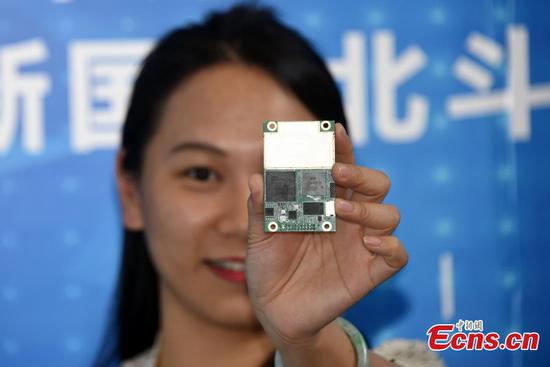
An employee demonstrates the Qualcomm Iris Authentication Solution during an industry expo. (Photo provided to China Daily)
U.S. chipmaker Qualcomm Inc is banking on its newly launched Snapdragon 710 chipset to bolster its artificial intelligence efforts and propel more smartphone makers to use the company's AI-enabled chips.
The product launch in Beijing came on the same day that Qualcomm Technologies Inc, a unit of Qualcomm Inc, announced plans to establish Qualcomm AI Research, an institute to power forefront AI research across the company, reiterating its desire to accelerate AI development.
"We are constantly pushing the boundaries of what's possible with AI," said Jim Thompson, executive vice-president and chief technology officer of Qualcomm Inc.
"We are dedicated to bringing together some of the best minds in the field to shape the road map of AI hardware and software platforms. Our goal is to make on-device AI ubiquitous," he said.
Chipsets, or mobile processors, are the brains behind everything from photo processing to data speeds. By incorporating key AI capabilities and performance advancements, the new chipset is targeting "premium midrange" phones.
It aims to make premium smartphone features less expensive as customers are looking for devices that offer flagship features similar to the iPhone X, but at a lower price. Xiaomi's forthcoming smartphone is likely to be one of the first smartphones that will use Qualcomm's Snapdragon 710.
According to the company, unlike the Snapdragon 660, the 710 has significant improvements including a 20 percent growth in performance, 25 percent rise in web browsing speeds, and 15 percent faster in application launch time.
"We have improved our AI performance by 200 percent in the past 12 months. Along with 5G, AI is poised to help drive innovation and generate economic benefits for consumer and industrial devices," said Cristiano Amon, president of Qualcomm Inc.
In addition, Qualcomm Technologies Inc said it would team up with Thundercomm Technology Co Ltd, an internet of things solution provider, to create AI-enabled products in China, including factory controllers, car accessories, retail cameras and robots.
Qualcomm Technologies Inc also inked a deal with NetEase Youdao to accelerate the implementation of Youdao's real-scene augmented reality translation.
Yitao Duan, chief Scientist of NetEase Youdao, said that it is a set of new visual interaction-based translation solutions that incorporate leading AI technologies, including dynamic tracking and neural network translation.


















































